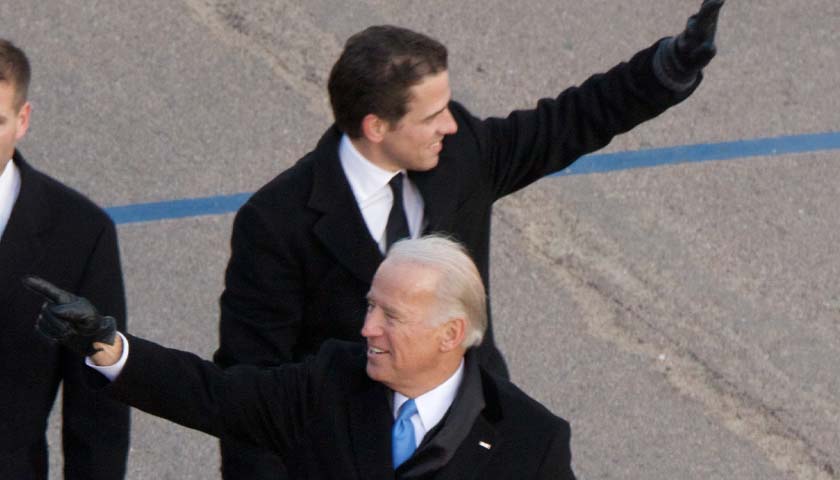by John Solomon
Banking whistleblowers first began raising alarms about Hunter Biden’s business deals as long ago as Spring 2015 while his father was still serving as vice president, flagging what they feared were “suspicious” transactions and “fraudulent” schemes. One of the bankers became so concerned he eventually escalated his concerns to the U.S. Securities and Exchange Commission (SEC) only a few days before Donald Trump won the presidency in 2016, according to documents provided to Congress and obtained by Just the News.
“Due diligence on involved parties reveals less than clean records,” a Morgan Stanley investment bank compliance presentation from May 2015 stated, specifically providing a dossier about Hunter Biden’s background, his expulsion from the Navy, his association with the Ukrainian energy company Burisma Holdings and photos of the future first son with Barack Obama and Joe Biden.
You can view that presentation here.
While SARS reports are frequently generated by compliance officers in the financial industry, the step of independently reporting information directly to the SEC is much more rare.
The documents obtained by Just the News chronicle the efforts by at least one vice president inside the Morgan Stanley investment bank to blow the whistle on companies affiliated with Hunter Biden and one of his chief business partners, Devon Archer. The concerns included that the firms may have been involved in a fraudulent bond scheme with the Native American Wakpamni tribe and may have improperly benefited from tax dollars in a separate technology investment.
Eventually two Morgan Stanley officials would file whistleblower complaints seeking investigations with federal agencies, according to interviews of people involved with the complaints. To date, there is no indication how those federal agencies under Presidents Barack Obama, Donald Trump or Joe Biden handled the information.
The SEC and Morgan Stanley both declined comment Thursday, saying they do not publicly discuss whistleblower cases. Abbe Lowell, a lawyer for Hunter Biden, did not return an email seeking comment.
The documents, however, make clear there were blaring alarms about Hunter Biden and his proximity to suspicious activity as early as eight years ago, much earlier than previously known.
The May 8, 2015 Morgan Stanley presentation deck – titled “Overview of Wakpamni Series 2014 Bonds Potentially Suspicious Structure & Transactions” – included a cover photo of Hunter Biden sitting alongside Joe Biden and Barack Obama and a dossier on past Hunter Biden controversies.
It also warned that some activities – including the Native American tribal bond scheme – required Morgan Stanley to take compliance action.
“No clear illegal activity is being accused, but authors of this presentation determined activity was suspicious enough to warrant escalation of review by appropriate internal Compliance representatives,” the internal presentation stated.
The presentation singled out just a few business partners, including Archer and Hunter Biden and provided dossiers on their backgrounds as well as frequent mention of their soon to be infamous investment firm Rosemont Seneca.
A page titled “Robert Hunter Biden,” for instance, mentioned the future first son’s unceremonious ejection from the Navy, his ties to Burisma and past allegations of financial management.
Hunter Biden was described at one point as a “partner at Rosemont Seneca” who sat “on the board of Ukrainian gas firm Burisma Holdings Ltd. with Devon Archer.”
“The Navy Reserve discharged Vice President Joe Biden’s son Hunter this year after he tested positive for cocaine,” the dossier added.
It also flagged an Aug. 25, 2008 article in The New York Times noting that Hunter Biden had faced controversy and a lawsuit over a hedge fund. “Biden’s Son Caught Up in Hedge Fund Trouble,” the article stated. ‘A son and a brother of Senator Joseph R. Biden Jr. of Delaware are accused in two lawsuits of defrauding a former business partner and an investor of millions of dollars in a hedge fund deal that went sour.”
Documents reviewed by Just the News indicate the presentation spurred a federal investigation into the tribal bond scheme, which led to the indictments of Archer and several other Hunter Biden associates one year later. All were eventually convicted. That indictment made no mention of Hunter Biden.
But behind the scenes, the investigation spurred panic inside Hunter Biden’s world, especially when a subpoena for Hunter Biden’s records arrived in March 2016, according to documents previously published by Just the News. Those documents came from from Hunter Biden’s abandoned laptop seized by the FBI in 2019. Hunter Biden’s concerns included the fact that he had not paid taxes on about $400,000 in income he had received from Burisma, the very same firm the Morgan Stanley whistleblower had flagged a year earlier in the compliance presentation.
On April 14, 2016 as the future president’s son scrambled to comply with the subpoenas. one of Hunter Biden’s business partners, Eric Schwerin wrote their lawyers: “Given that I will be out of the country starting Monday we wanted to make sure any time we spend between now and the 20th focused mostly on the main issues that the SEC and DOJ are concerned with — the emails, proof of payments out of RSB[CG2] and talking points for your proffer — and not let ourselves get overly bogged down in the minutiae of tax issues that might not even come up in the immediate.” Schwerin added that “We feel like we have a good story to tell there and have a good handle on that now.”
After the 2016 indictments, the Morgan Stanley vice president who first blew the whistle back in May 2015 flagged new concerns that went beyond the tribal bond scheme. On Nov. 1, 2016, using a lawyer from New York, the whistleblower filed a formal complaint with the SEC under the Dodd-Frank financial reform law.
The whistleblower – whose name was redacted from the complaint obtained by Just the News – flagged two cases in the complaint. The first was unrelated to Hunter Biden and Archer. But the other directly involved the Rosemont Seneca firm run by the two politically connected figures close to Joe Biden.
The complaint itself did not directly mention Hunter Biden but a series of attachments incorporated in the complaint clearly did, including the May 2015 compliance presentation complete with the Hunter Biden dossier.
The whistleblower “had made various reports to his employer, Morgan Stanley, regarding the fraudulent schemes detailed in the addendum, which were perpetrated by third parties,” the complaint said.
“In addition to seeking recovery in connection with his prior reporting [the whistleblower name redacted] makes this submission offering new information concerning additional securities frauds being perpetrated,” the complaint continued.
You can read that complaint here.
Concerning the tribal bond scheme, the complaint noted that “Morgan Stanley’s Financial Crimes Division commended Mr. [redacted] noting he had ‘exercised excellent judgment in not only refusing the purchase, but also recognizing that the transactions were suspicious and escalating the matter to an AML [or Anti-Money Laundering] group.”
In a section of the complaint titled “Fraudulent Schemes Perpetrated by Devon Archer and his Associates,” the whistleblower said he had obtained “information regarding self-dealing transactions concerning Archer, along with certain of his other associates, and involving mbloom, a fraudulent technology fund.”
Mbloom has long been a concern to congressional investigators and news reporters looking at Hunter Biden business dealings because it was receiving taxpayer funds from the federal TARP program through the state of Hawaii.
Hunter Biden’s connection to the mbloom enterprise has been murky. Emails on his laptop – originally dismissed by the Bidens and their supporters in the media as “Russian disinformation” – show Hunter Biden was kept apprised by Archer of the effort to fund mbloom.
But a top aide to Ukrainian oligarch Dmytri Firtash – indicted by the Obama-Biden Justice Department – told Just the News two years ago that Hunter Biden directly arranged for him to invest in mbloom in 2015 after a failed effort to try to lobby the U.S. government to drop its charges against Firtash.
The tale begins in April 2015, when Hunter Biden got an email from Archer about a plan to assist Firtash, a Ukrainian who at the time was under U.S. indictment.
The goal was to see whether Firtash’s indictment could be erased or eased with the help of the Obama-Biden State Department, where Hunter Biden’s father held much sway and where the vice president’s longtime national security adviser, Tony Blinken, served as deputy secretary under John Kerry, according to emails and interviews published by Just the News.
By June 2015, the discussions had evolved enough that a member of Firtash’s inner circle — his childhood friend Hares Youssef — traveled to the United States to meet with Hunter Biden. Eventually, Biden told Youssef that he could not help on the Firtash case, and the conversation evolved to how Hunter Biden and his partner Archer might be able to help Youssef with one of his companies aspiring to create micropayment donations technology, Youssef told Just the News.
Youssef said Archer introduced him to a technology fund in Hawaii called mbloom and persuaded him to invest. By September 2015, Youssef said he was investing $3 million of his own money in mbloom, a transfer that was immediately flagged by U.S. banking officials, according to a Suspicious Activity Report (SAR) filed with the Treasury Department and first revealed in the International Consortium of Investigative Journalists’ FinCEN Files.
After Youssef’s money reached America, mbloom transferred much of it to an affiliate company called mbloom BDC Advisor LLC, according to the SAR report cited by the FinCen Files Web site. And mbloom BDC Advisors LLC sent $275,000 to a company controlled by Archer called Rosemont Seneca Bohai LLC, according to records obtained by the FBI.
The whistleblower’s complaint alleged his concerns about mbloom involved “an undisclosed self-dealing scam involving mbloom, a Hawaii-based venture capital fund in which Archer invested and which was also partially funded by taxpayer dollars.” His complaint noted the venture received $10 millionI in funding from a Hawaii state program and urged the SEC to investigate. Mbloom has denied engaging in wrongdoing.
– – –
John Solomon is an award-winning investigative journalist, author and digital media entrepreneur who serves as Chief Executive Officer and Editor in Chief of Just the News.
Photo “Joe and Hunter Biden” by Ben Stanfield CC2.0.





